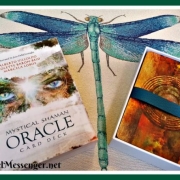The Goddess Of Compassion Inspires Us
To Put Love Into Action
from our Angel Messenger Creative Team
What do you see when you look at the world? A dire situation that’s getting worse? Human suffering has a long history, and it can be overwhelming.
How can we notice suffering, without getting dragged down with it? Put away the negative news, and discover Kuan Yin, the Goddess of Compassion. She is just as relevant today as she was millennia ago.
Who is Kuan Yin?
Kuan Yin’s story began in India, where she first appeared as the male deity, Avalokitesvara. Avalokitesvara was a Buddhist bodhisattva associated with compassion.
Over two thousand years ago, Avalokitesvara’s story was introduced to modern-day China, and people warmly welcomed him. Over the centuries, Avalokitesvara became a female deity named Kuan Yin.
Despite these changes, she has always been a deity of mercy and compassion. Even today, Kuan Yin is loved and revered in Chinese folk religions. Once you get to know her story, you’ll love her, too.
How Kuan Yin shows compassion
It is widely believed that the compassionate and loving Kuan Yin reached enlightenment. But when she stood at the threshold of eternal bliss, she heard the suffering on earth and stopped.
She renounced her nirvana and stayed on earth to spread love and compassion. For this reason, Kuan Yin can take on many forms. She can appear as male, female, adults, children, human, non-human and even as other deities.
One of her most beautiful manifestations is her incarnation as Miao Shan.
The legend of Miao Shan
Once there was a cruel king who had three daughters. He wanted them to marry a wealthy man, but his youngest daughter, Miao Shan, wanted something different.
Miao Shan wanted to be a Buddhist nun and perfect herself through spiritual practice. This angered the king and he kicked her out of his kingdom. After many years, he became seriously ill.
kicked her out of his kingdom. After many years, he became seriously ill.
One day, an old monk visited the king. (The monk was Miao Shan herself.) He told the king that a special potion would cure him. There was one small detail though. The potion had to be made from the eyes and arms of someone who gave them freely.
The king asked his two older daughters for their help, but not surprisingly, they refused. To ease the king’s growing despair, the monk mentioned a Bodhisattva of compassion who lived at the top of the Fragrant Mountain. “Perhaps she can help you,” the monk suggested.
Desperate to be cured, the king sent his messenger to the Fragrant Mountain. There, Miao Shan appeared to the messenger in her true, resplendent form. She revealed that the king’s illness was a punishment for his sins. But because she was still his daughter, she chose to give him her eyes and arms.
When the king’s messenger and monk returned to the king, the monk prepared the magical elixir. Soon, the king made a full recovery, but the monk refused to take credit. Instead, he told the king, “Thank the one who made this sacrifice for you.”
Eager to thank the holy Bodhisattva, the king hurried to the Fragrant Mountain. But when he arrived, he found his beautiful daughter, now blind and without arms, preaching to hundreds of followers. There before everyone’s eyes, Miao Shan transformed into a divine image of Bodhisattva.
In some legends, it is said that she has a thousand eyes and a thousand arms so she can be of even greater service to those suffering.
What does “Kuan Yin” mean?
Chinese cultures lovingly gave Kuan Yin her name because it means “One Who Sees and Hears the Cry from the Human World.” But she doesn’t just hear the cries of suffering and then ignore them. Kuan Yin responds with love and compassion. This is what makes her such a relevant role model today.
You and Kuan Yin are not very different
You may think you have nothing in common with Kuan Yin. She reached full enlightenment but chose to stay on the earth. Most of us, on the other hand, see suffering and run the other way.
She showed her cruel father unconditional love after being exiled. This, too, is a hard story to relate, too.
But don’t get caught up in the literal-ness of her story. These are mortal details, and Kuan Yin invites us to rise above earthly labels so we can focus on more important questions, like:
- How can we extend ourselves to others?
- How can we notice others?
- How can we get out of our own heads, out of our own drama, and out of own victim mentality?
- Can we start to recognize suffering, not just in the poor and disempowered, but in the positions of power, too?
- How can I see suffering and give love?
So often, we get caught up in this concept of “loving” others, but our love doesn’t always get put into action. But it should. That’s what love does best. And Kuan Yin is an example of love and compassion in action.
No matter where you call home, and no matter what religion or spiritual practice you associate with, we can all learn something from Kuan Yin: We all have the ability to notice when things aren’t right and to give love anyways.
The question is, what will you do after you notice? Everyone’s response will be different. What’s yours? How would you take your love and extend it to others – even without a thousand eyes and a thousand arms?
Much Love & Angel Blessings,
- The Health Benefits to Taking a Salt Bath & Why it Should be Part of Your Routine - September 27, 2021
- The Benefits of Being Creative - August 16, 2021
- How to Cope with the Loss of a Loved One - July 19, 2021
- How to Get a Live Psychic Reading Without Getting Scammed - May 10, 2021
- 10 Tips to Boost Your Immune System - April 19, 2021
- The Ultimate Guide to Buying Your First Angel Card Deck for Angel Readings - March 8, 2021
- 11 Ways to Connect and Work with Your Angels and Spirit Guides - February 1, 2021
- 7 Signs Archangel Gabriel is Near You - January 4, 2021
- How to Do a Spiritual Retreat at Home - December 7, 2020
- 10 Tips to Help You Protect Yourself from Negative Energy - November 30, 2020











Leave a Reply
Want to join the discussion?Feel free to contribute!